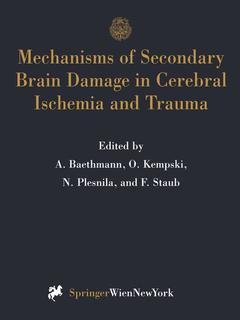Mechanisms of Secondary Brain Damage in Cerebral Ischemia and Trauma, Softcover reprint of the original 1st ed. 1996 Acta Neurochirurgica Supplement Series, Vol. 66
Langue : Anglais
Coordonnateurs : Baethmann Alexander, Kempski Oliver S., Plesnila Nikolaus, Staub Frank

The publication of the Vth International Symposium 1995 on "Mechanisms of Secondary Brain Damage" in Mauls/ltaly is a collection of focused reviews reaching from novel molecular- and cell biological findings to aspects of clinical management in head injury and cerebral ischemia. A specific purpose of these series of meetings introduced in 1984 is for an exchange on problems of mutual interest by international high ranking experts from the basic sciences and related clinical disciplines, such as intensive care medicine, neurology, or neurosurgery. The present volume covers three major areas: (a) Molecular and cell biological mechanisms including inflammation (b) Novel findings on mechanisms and treatment in cerebral ischemia (c) Secondary processes in head injury, regeneration and treatment Molecular-and cell biology is currently attracting attention towards activation of genomic processes associated with the demise of cells referred to as "programmed cell death" and "apoptosis" which, actually, might be distinguished from each other. Thus, the phenomenon of delayed neuronal death in selectively vulnerable brain areas following brief interruption of blood flow is scrutinized as to the contribution of the activation of suicide genes. The physiological role of such a response, among others, is removal of surplus neurons during ontogenesis of the brain. Yet, evidence is accumulating that similar mechanisms playa role in cerebral ischemia, probably also trauma, where nerve-and other cells demonstrate features of apoptosis. Observations on protection of neurons by administration of protein synthesis inhibitors in cerebral ischemia provide more direct support.
Molecular and Cell Biological Mechanisms — Inflammatory Processes.- Molecular Correlates of Delayed Neuronal Death Following Transient Forebrain Ischemia in the Rat.- Molecular Mechanisms of Acidosis-Mediated Damage.- Is Calcium Accumulation Post-Injury an Indicator of Cell Damage?.- Apoptosis in Focal Cerebral Ischemia.- Significance of the Inflammatory Response in Brain Ischemia.- Leukocytes, Macrophages, and Secondary Brain Damage Following Cerebral Ischemia.- Inflammation of the Brain after Ischemia.- Novel Findings on Mechanisms and Treatment of Cerebral Ischemia.- Three-Dimensional Metabolic and Hemodynamic Imaging of the Normal and Ischemic Rat Brain.- Origins of Glutamate Release in Ischemia.- Swelling, Intracellular Acidosis, and Damage of Glial Cells.- Environmental Influence on Outcome After Experimental Brain Infarction.- Fetal Neocortical Grafts Placed in Brain Infarcts Do Not Improve Paw-Reaching Deficits in Adult Spontaneously Hypertensive Rats.- Extended Studies on the Effect of Glutamate Antagonists on Ischemic CA-1 Damage.- Thrombolysis in Acute Ischemic Stroke.- Recent Observations on Mechanisms, Regeneration, and Treatment in Head Injury.- Traumatically Induced Axonal Damage: Evidence for Enduring Changes in Axolemmal Permeability with Associated Cytoskeletal Change.- Expression of Microglial Markers in the Human CNS After Closed Head Injury.- Altered ß-APP Metabolism After Head Injury and its Relationship to the Aetiology of Alzheimer’s Disease.- Principles of Neuronal Regeneration.- Neuroprotective Efficacy of Microvascularly-Localized Versus Brain-Penetrating Antioxidants.- “Small Volume Resuscitation” as Treatment of Cerebral Blood Flow Disturbances and Increased ICP in Trauma and Ischemia.- Conduct of Head Injury Trials in the UnitedStates: The American Brain Injury Consortium (ABIC).- Index of Keywords.
Date de parution : 02-2012
Ouvrage de 124 p.
21x27.9 cm
Thèmes de Mechanisms of Secondary Brain Damage in Cerebral... :
Mots-clés :
Alzheimer; Trauma; intensive care medicine; neurology; neurosurgery
© 2024 LAVOISIER S.A.S.



